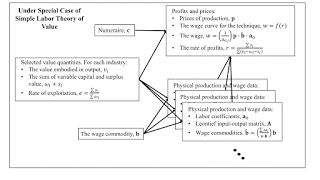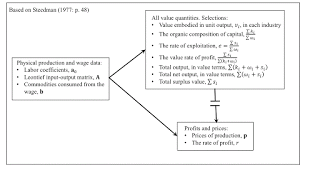Figure 1: Physical Production Data as a Side Route1.0 Introduction One way of reading the first volume of Marx's Capital is that labor values provide a foundation, upon which the structure of prices of production and, eventually market prices are based. I find that, for example, Joseph Schumpeter presents Marx's work in this way. Another reading takes both labor values and prices as founded on physical data specifying the technique in use. Ian Steedman, as illustrated in Figure 2, argues for such a reading. Furthermore, Steedman argues that one cannot get from the system of labor values to prices. Labor values are not needed for analyzing prices of production; they are redundant. Figure 2: Labor Values as a Side Route These are not the only possible ways of reading Marx. Another
Topics:
Robert Vienneau considers the following as important: Karl Marx
This could be interesting, too:
Robert Vienneau writes The History Of No-Longer-Existing Socialism Validates Marx
Robert Vienneau writes William Baumol On Marx
Robert Vienneau writes Francis Spufford On Commodity Fetishism As A Dance
Robert Vienneau writes A Derivation Of Prices Of Production With Linear Programming

|
| Figure 1: Physical Production Data as a Side Route |
One way of reading the first volume of Marx's Capital is that labor values provide a foundation, upon which the structure of prices of production and, eventually market prices are based. I find that, for example, Joseph Schumpeter presents Marx's work in this way.
Another reading takes both labor values and prices as founded on physical data specifying the technique in use. Ian Steedman, as illustrated in Figure 2, argues for such a reading. Furthermore, Steedman argues that one cannot get from the system of labor values to prices. Labor values are not needed for analyzing prices of production; they are redundant.

|
| Figure 2: Labor Values as a Side Route |
These are not the only possible ways of reading Marx. Another reading might emphasize the bits on commodity fetishism. Nothing is hidden. In selling produced commodities on the market, the concrete work activities that go into making commodities are abstracted from and treated as commensurable. This is crazy, but according to Marx, this is how capitalism works.
I seem to have stumbled on some mathematics supporting the first reading. I consider the question of what physical data is consistent with given labor values and direct labor inputs, under the condition that the organic composition of capital does not vary among industries. The issue is not that there is no way to go from labor values, through data on physical production, to prices. Rather, there are too many routes - in fact, an infinite number of them.
Figure 1 is not quite how I present my results in my draft paper. I end up with the wage curve for the price system; unlike in the above diagram, I do not close the system. I am not sure I am correct on how I specify distributive variables in the figure. I end up with the wage as a vector, where the same money wage is earned in each industry. I found it natural to close the system with the rate of profits when going from labor values to prices. On the other hand, I found it more convenient to specify the wage in going from physical data to prices. Perhaps these closures need more thought.
A substantial issue is whether it makes any sense to talk about labor values prior to and independently of physical data on processes of production. Steedman asserts it is not possible. Marx, in the first volume of Capital goes back and forth between labor values and prices. I might need to think a little more about how money, or the choice of a numeraire, fits into this, but I seem to be arguing for this possibility, at least under the conditions in which a simple labor theory of value holds as a theory of price.
 Heterodox
Heterodox
